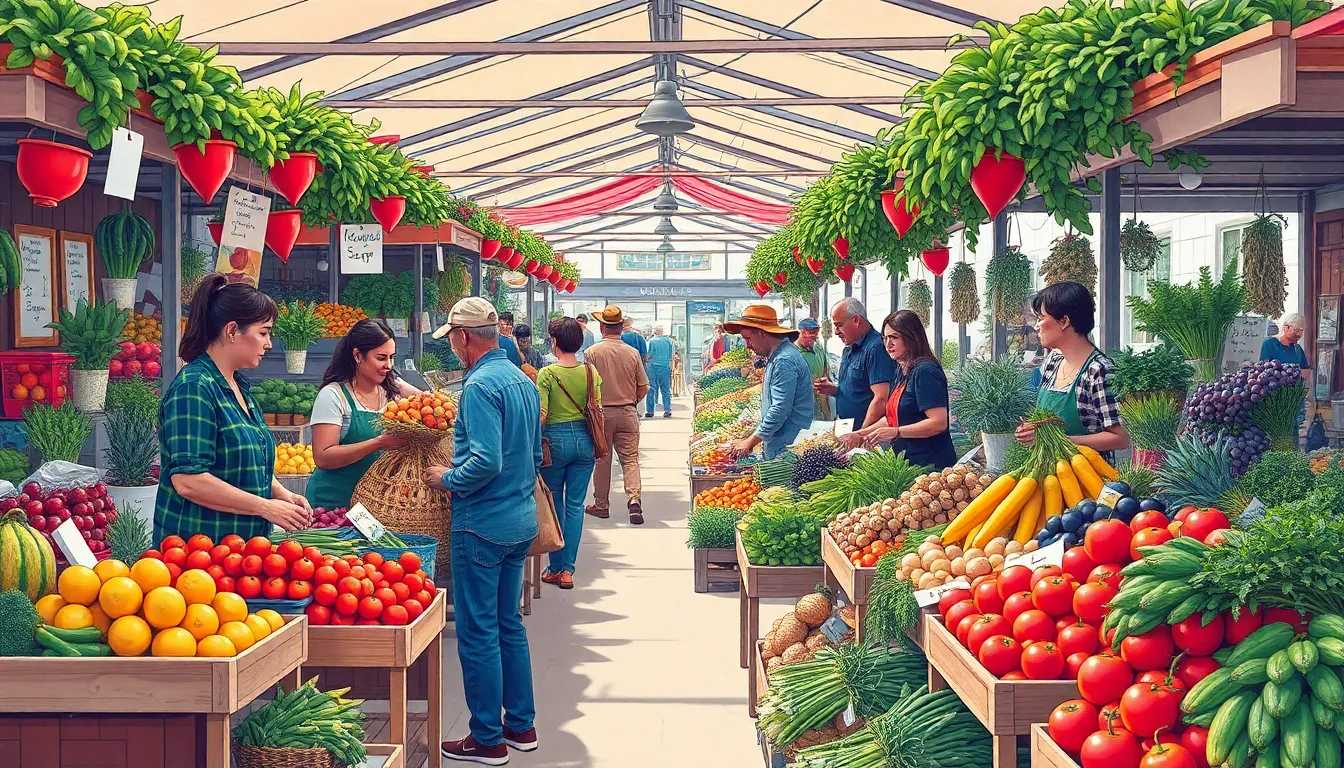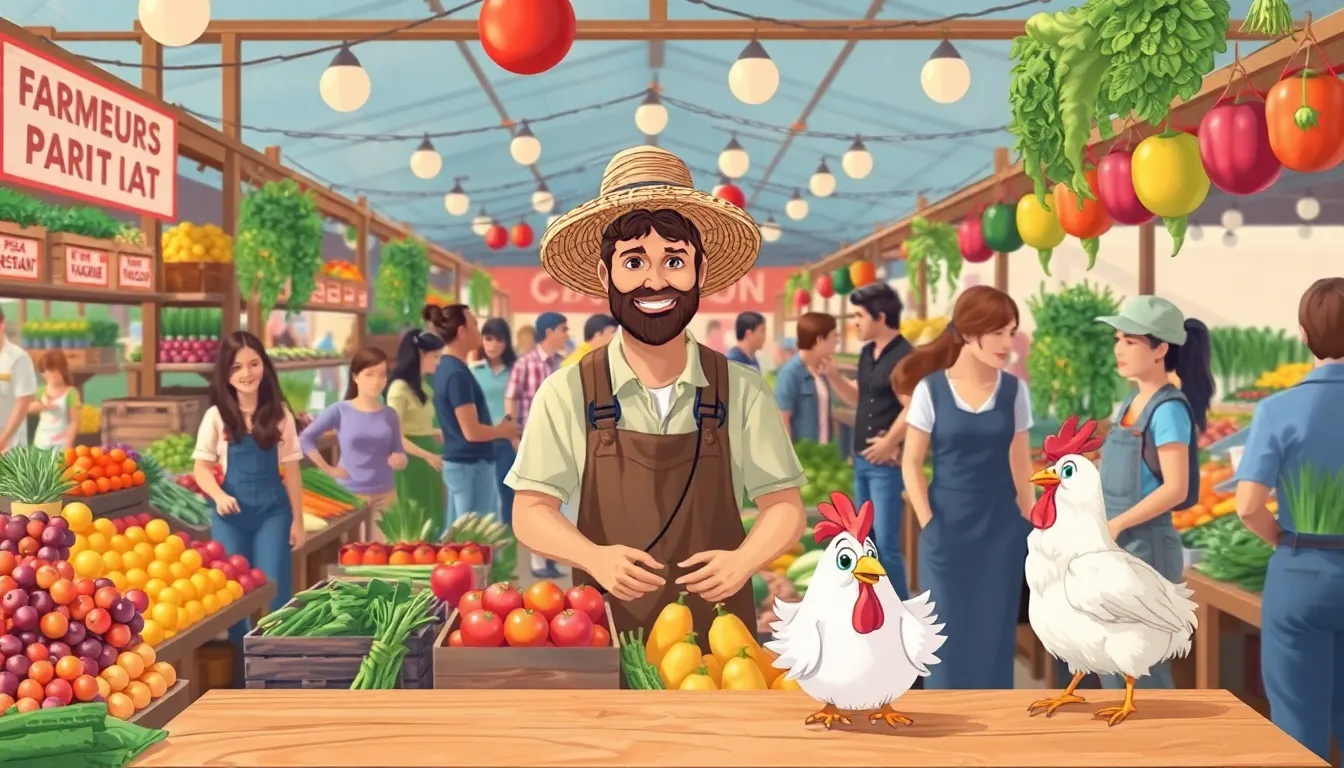Imagine strolling through a vibrant local farmers market, where the air’s filled with the sweet scent of ripe strawberries and the sound of laughter dances around you. It’s not just a place to grab fresh produce; it’s a community hub brimming with life, flavor, and the occasional chicken wearing a tiny hat. Who knew shopping for veggies could be this much fun?
Table of Contents
ToggleOverview of Local Farmers Markets
Local farmers markets serve as vibrant hubs for agriculture and community interaction. These markets foster connections between consumers and producers while promoting local food systems.
Definition and Purpose
A local farmers market is a designated space where farmers sell their products directly to consumers. The primary purpose focuses on providing fresh, seasonal produce and other goods. Markets typically feature fruits, vegetables, flowers, and artisanal items, reflecting local agriculture. Many markets emphasize sustainability and organic practices, benefiting health-conscious shoppers. These venues foster relationships between growers and communities, enhancing consumer awareness of food origins.
Importance in the Community
Farmers markets play a crucial role in community cohesion. They promote local economies by supporting small-scale farmers and artisans, generating increased regional income. Local events frequently occur at markets, encouraging social interactions and strengthening community bonds. The presence of fresh produce improves access to healthy food options, benefiting public health. Environmental awareness also grows as consumers engage with sustainable practices. Markets encourage education about nutrition and agriculture, fostering a more informed public.
Benefits of Shopping at Local Farmers Markets

Shopping at local farmers markets offers numerous advantages, making it a preferred choice for many consumers.
Freshness and Quality of Produce
Freshness stands out as a key benefit of purchasing from local farmers markets. Produce harvested within days or hours maintains peak flavor and nutritional value. Seasonal fruits, vegetables, and herbs exhibit vibrant colors and textures, ensuring higher quality. Farmers often follow sustainable practices, resulting in healthier, pesticide-free options. Shoppers frequently engage with growers, gaining insights into the origins of their food. Knowledge about farming methods enhances trust and transparency in food sourcing. Additionally, local markets often sell unique varieties not found in grocery stores, enriching culinary experiences.
Supporting Local Economy
Supporting the local economy is a significant advantage of shopping at farmers markets. Local farmers keep a larger portion of the revenue from their sales, benefiting their businesses directly. This practice helps foster job creation within the community, strengthening economic resilience. Communities thriving through local markets witness reduced carbon footprints due to shorter transportation distances. Increased purchases at farmers markets lead to a more vibrant local food system. Moreover, keeping money in the community encourages further investment in local initiatives and services. Engaging in farmers markets also promotes a sense of pride in local agriculture and contributes to community sustainability.
What to Expect at a Local Farmers Market
Local farmers markets offer a delightful assortment of goods, creating an engaging space for shoppers. Visitors can immerse themselves in an array of fresh produce, artisan foods, and handmade items.
Variety of Products
Produce items typically include seasonal fruits, vibrant vegetables, and unique herbs. Shoppers enjoy discovering organic options, specialty crops, and heirloom varieties. Artisan breads, locally crafted cheeses, and preserved goods expand the selection. Flowers and plants, often locally grown, enhance the market’s atmosphere. Options for prepared foods, such as ready-to-eat meals or snacks, cater to different tastes. Customers often find handmade crafts and products, such as soaps and candles, which showcase regional talent.
Typical Vendors and Their Offerings
Farmers form a significant part of the vendor lineup, bringing their fresh, seasonal harvest directly to consumers. Local artisans provide handcrafted items, including pottery, textiles, and jewelry, contributing to the market’s charm. Many bakers and chefs display baked goods and gourmet treats, attracting sweet lovers. Beekepers typically sell raw honey and other honey-related products, promoting local pollination efforts. Additionally, ranchers offer grass-fed meats and free-range eggs, appealing to health-conscious shoppers. Vendors often share stories about their products, enhancing customer connections and promoting community spirit.
Tips for Visiting a Local Farmers Market
Visiting a local farmers market offers an enjoyable experience. Knowing a few tips can enhance that visit.
Timing Your Visit
Arriving early in the morning ensures access to the freshest produce. Vendors often have limited quantities of popular items like heirloom tomatoes or specialty mushrooms. Mid-morning typically sees an increase in foot traffic, which may lead to crowded aisles. Late morning before closing can result in discounts as vendors aim to sell remaining items. Observing vendor patterns helps in making the most out of the shopping trip.
How to Choose the Best Products
Evaluating produce requires attention to color and freshness. Look for vibrant colors, as they often indicate ripeness and flavor. Gently squeeze fruits like peaches or avocados to check for tenderness. Speaking to vendors about their growing practices provides deeper insights into product quality. Seeking out organic and unique varieties, such as rare heirloom vegetables or specialty cheeses, enhances the shopping experience. Always consider seasonal items, as they offer the best flavors and value.
Local farmers markets offer an enriching experience that goes beyond purchasing fresh produce. They serve as vital community hubs where connections flourish and local economies thrive. The vibrant atmosphere invites shoppers to engage with vendors and learn about the origins of their food.
By choosing to shop at these markets, individuals support sustainable practices and enjoy the benefits of fresh, high-quality products. The unique offerings and personal stories shared by vendors create a sense of belonging and pride in local agriculture.
Visiting a farmers market not only enhances one’s diet but also fosters a deeper appreciation for the community and its resources. Embracing this experience contributes to a healthier lifestyle while promoting environmental awareness and economic resilience.



